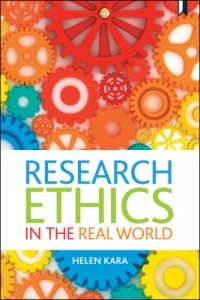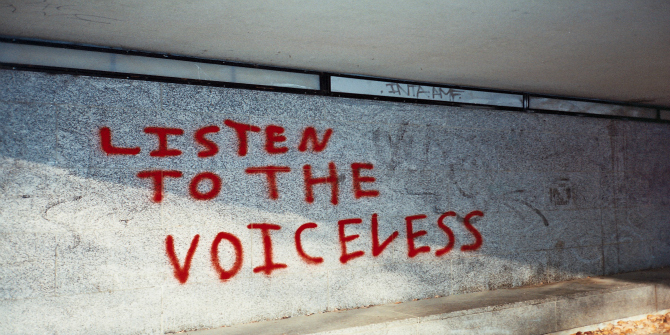In Research Ethics in the Real World, Helen Kara offers a wide-reaching exploration of research ethics, drawing on both European/Western and Indigenous ethics paradigms and perspectives. The book will prove valuable for researchers looking to expand their consideration of ethics into all aspects of a research project, recommends Mariel McKone Leonard.
Research Ethics in the Real World. Helen Kara. Policy Press. 2018.
It is a common misconception both in and about the social sciences that ‘because there is only one reality, there can be only one real truth’ (Addelson, 16). Epistemological certainty of this sort may be possible within the natural sciences, but it is detrimental to the social sciences (Flyvberg 2001, 2016), allowing criticism on two fronts: those who assume a lack of universality equals a lack of rigour or value compared to the natural sciences (such as Sokal 1996; see also Kafka 2018), as well as those who argue that the social sciences as they are commonly taught and practised perpetuate the othering and exploitation of non-Europeans/Westerners (Soto 2004). Rescuing the social sciences – defending it on the one hand from often spurious charges of low standards, and addressing the valid critiques of Indigenous and feminist scholars, on the other – has become the work of a growing number of social scientists.
Bent Flyvbjerg (2001, 2016), among others, has argued convincingly that it is phronesis, not epistemology, which should be the guiding philosophy of the social sciences. Phronesis, often translated as ‘virtuous praxis’ (Ngwenyama and Klein 2018), rejects epistemology’s universalism and value neutrality in favour of a perspective that is contextual, reflexive and comprehensive. Phronetic science considers not what we know, but how we know it, not in the technological sense of how the knowledge is produced, but in the relational and political sense of ‘who gains and who loses [by the knowledge], and by which mechanisms of power?’ (Flyvbjerg 2016). As knowledge (such as data) does not (usually) simply fall from the sky like Issac Newton’s apocryphal apple, but rather must be produced or generated by some method which shapes the meaning of said knowledge, phronesis can also be said to be concerned with this stage of the research process. The virtuous praxis of knowledge production is, simply, the discipline of research ethics.
Unfortunately, ethics in the European/Western paradigm (which is to say, the paradigm most commonly referenced by research organisations and, subsequently, researchers) is similarly driven by the natural sciences, specifically medical research (Sokol 2013). In March 2018 alone, Nature, one of the top scientific journals in the world, published two separate editorials about ethics in research (How to be good; Digital trust). The authors of these editorials and codes of ethics argue that they tell researchers ‘how to be good’, but too often they deliver a set of principles with little discussion of how to put them into practice. While problematic for all scientists, regardless of field or discipline, the ethical codes of the natural sciences are too axiomatic for the social sciences. It is all very well and good to ‘support diversity’ (World Economic Forum Principle 5) or even, ‘first, do no harm’ (Sokol 2013), but we must ask ourselves, realistically, what does this mean?
Enter Helen Kara and her latest book, Research Ethics in the Real World.
Kara begins by placing research ethics in context, through the course of individual chapters introducing both the European/Western and Indigenous ethics paradigms, as well as the regulation of research ethics and their use. In her discussion of Indigenous ethics, Kara provides both descriptions by Indigenous researchers (2), as well as summaries of the four principles of Indigenous ethics: relational accountability, communality of knowledge, reciprocity and benefit sharing (25-26). Readers familiar with reflexivity and reflexive methodologies (such as those found in feminist research) will recognise the commonalities between these two research approaches. Kara is careful to point out, however, that Indigenous research and ethics do not stem from reflexive European/Western research, but rather predate it. This fact alone should make Indigenous ethics worthy of consideration. Interestingly, several countries with large Indigenous populations (such as Canada and Australia) appear to have begun to incorporate concepts drawn from Indigenous communities into their ethical guidelines.
The chapters in the second part of the book delve into the different stages of a research project, with consideration of both ethical paradigms. Here, Kara both explicates and criticises the dominance of European/Western ethics and its narrow definition of who may be affected, or harmed, by research, and how. Informed by both Indigenous as well as reflexive streams of European/Western ethics, Kara argues for expanding the definition of those affected beyond research subjects to include all participants, including researchers. In doing so, Kara readily takes up the charge of phronesis: to grow ‘society’s capacity for value-rational deliberation and action’ (Flyvbjerg 2016).
The book also makes extensive reference to the companion website, which provides links to many of the ethical codes of conduct (either developed by professional organisations or required for government funding of research) discussed in the text. While the up-to-date readings and links available on the companion website and the inclusion of reflexive questions at the end of each chapter will be beneficial to both instructors and students, the real pedagogical strength of the book lies in Kara’s use of ‘real world’ examples. Several of these can be found on the website as ‘scenario-based exercises’: short vignettes that reinforce the reality that social science is produced, even negotiated, and thus requires practitioners to balance sometimes conflicting moral goods. As examples, Scenario 5 is taken from Lucie Cluver et al’s 2014 research with South African families suffering from HIV/AIDS; Scenario 7, which considers the often emotional response of interviewees and even interviewers to questions about traumatic experiences, is similar to situations I have encountered in my own work with refugees and victims of violence. While some of these scenarios may ultimately have a ‘right’ answer, reaching them will require considerable moral wrestling. Others may offer only wrong or ‘less bad’ options.
Kara also provides case studies and reflections from scholars on the issues they encountered during specific stages of their research. These are reminiscent of Colin Bell and Howard Newby’s (1977) Doing Sociological Research in their presentation of the story behind the research. While some serve as useful thinkpieces, others provide poignant evidence that even under the most promising of circumstances in which a researcher has communal and institutional support, research of the promised variety may not be possible. One story in particular has stayed with me: that of Issaka Traore from Burkina Faso (60). Despite acceptance to several UK universities for graduate work, he was unable to secure funding and instead returned to Burkina Faso. While Traore has found work as a development project evaluator, this is a powerful reminder of the distance still to be travelled in order to equalise the social sciences, as well as the disservice done by the academy in not discussing obstacles to research and the often asymmetric costs and consequences to women and minorities.
In all cases, the examples provide pointed reminders of how ‘human subjects’ research, and the social sciences more broadly, are inherently context- and value-sensitive. While Research Ethics in the Real World is intended – and ideal – for an introductory class on research ethics, it will also prove valuable for researchers looking to expand their consideration of ethics into all areas of a research project, beyond simply ‘checking the box’ with their ethics review board.
Note: This review gives the views of the author, and not the position of the LSE Review of Books blog, or of the London School of Economics.
Image Credit: (Gerd Altmann CCO).


 Find this book:
Find this book: 





